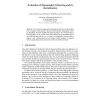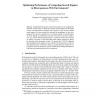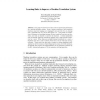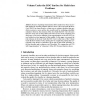ECML
2003
Springer
15 years 8 months ago
2003
Springer
We consider the topographic clustering task and focus on the problem of its evaluation, which enables to perform model selection: topographic clustering algorithms, from the origin...
ECML
2003
Springer
15 years 8 months ago
2003
Springer
Abstract. Most of multi-agent reinforcement learning algorithms aim to converge to a Nash equilibrium, but a Nash equilibrium does not necessarily mean a desirable result. On the o...
126
click to vote
ECML
2003
Springer
15 years 8 months ago
2003
Springer
Abstract. Tree induction methods and linear models are popular techniques for supervised learning tasks, both for the prediction of nominal classes and continuous numeric values. F...
117
click to vote
ECML
2003
Springer
15 years 8 months ago
2003
Springer
A central issue in logical concept induction is the prospect of inconsistency. This problem may arise due to noise in the training data, or because the target concept does not fit...
122
click to vote
ECML
2003
Springer
15 years 8 months ago
2003
Springer
Abstract. Distributed heterogeneous search environments are an emerging phenomenon in Web search, in which topic-specific search engines provide search services, and metasearchers...
ECML
2003
Springer
15 years 8 months ago
2003
Springer
In this paper we show how to learn rules to improve the performance of a machine translation system. Given a system consisting of two translation functions (one from language A to ...
106
Voted
ECML
2003
Springer
15 years 8 months ago
2003
Springer
We present in this paper a method to introduce a priori knowledge into reinforcement learning using temporally extended actions. The aim of our work is to reduce the learning time ...
139
Voted
ECML
2003
Springer
15 years 8 months ago
2003
Springer
We consider supervised learning of a ranking function, which is a mapping from instances to total orders over a set of labels (options). The training information consists of exampl...
ECML
2003
Springer
15 years 8 months ago
2003
Springer
126
click to vote
ECML
2003
Springer
15 years 8 months ago
2003
Springer
Abstract. In this work we investigate several issues in order to improve the performance of probabilistic estimation trees (PETs). First, we derive a new probability smoothing that...




